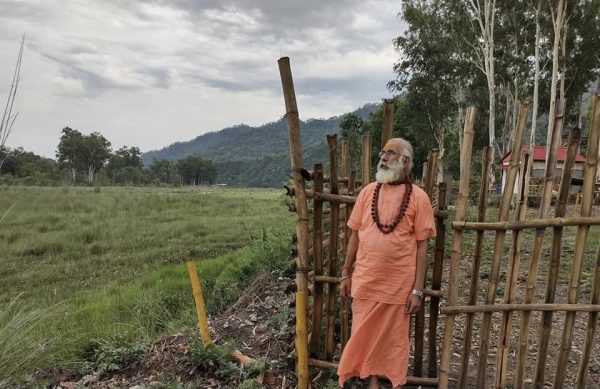
Alakh Jyoti Ashram is situated at the base of the Himalaya Mountains in Bangana, in the district of Una, Himachal Pradesh State, India. Acharya Shri Rajendra Alakh is the Peethadheeshwar of Alakh Jyoti Ashram and it is managed by Alakh Jyoti Foundation.
The core of the Alakh Jyoti Ashram activities is a customized system of yoga called Alakh Yoga. The introductory program, known as Inner Transformation , introduces guided meditations and a powerful inner energy process for deep inner transformation and inner formatting.
Across the world Indian culture is widely known for its richness and its diversity. Due to which hundreds of thousands of spiritual seekers from across the world are attracted towards the culture of India and Yoga Ashrams in India. Amongst all definitely, the much appreciated and attractive one is Yoga and Meditation, which is a combination of the physical, mental, and spiritual practices or disciplines. Originated in ancient India with a mention in the Rig Veda (one of the 4 Vedas), some of the earliest references to meditation are found in the ancient scriptures in India and Nepal.
Although Alakh Jyoti Ashram offers an opportunity to a Yoga & Spiritual retreat, it also provides all modern amenities.
There will be many daily Yoga asana practice times including study of pranayama, chanting of mantras and meditation. All meals will be provided with delicious pure vegetarian cuisine.
In addition to the Yoga, Meditation Retreat at the Yoga Ashram, there will be interesting and fun outings to other places of interest including popular temples visit in Himalaya, trekking, and shopping.
This will be a very wonderful and special experience of Yoga & meditation led by the very experienced and inspiring teacher
Participants will have an opportunity for self-rejuvenation and healing, a deeper experience of themselves and yogic life and the benefit of Yoga in their life.
Hopefully, You will be able to attend this life-enriching experience of Alakh Yoga and the benefits of Alakh Yoga at Alakh Jyoti Ashram!


WHERE
Alakh Jyoti Ashram situated at the base of the Himalaya. ‘According to ancient scriptures, this mystical place was home to numerous great saints and seers, who, through their austerities, sanctified all the earth they walked on. The Alakh Jyoti Ashram is surrounded by the magnificent beauty of nature with green rolling hills, majestic trees and a river running in front of the Yoga ashram. This setting offers a peaceful and inspiring place to learn and practice yoga. The sound of the river and birds singing, with the sun shining through green leaves allows one to Yoga retreat from worldly cares and go deeper into one’s study and practice of Yoga & meditation.
The place is getting transformed with the ashram’s new Shiva temple, cottages, and meditation halls, providing a panoramic view of Nature’s splendour. Infrastructure is gradually being enhanced with the support of peoples from all around the world.
CURRICULUM OF THE ASHRAM
Inner Transformation – Inner transformation is a technology for wellbeing derived from the ancient science of yoga. For those seeking professional and personal excellence, this program offers keys for meaningful and fulfilling relationships at work, at home, in the community, and most importantly, within yourself
Spiritual Yoga study – The Yoga technique or spiritual practice was developed to help achieve unity of mind, body and soul or moksha or liberation. … Traditionally, Hatha Yoga is a holistic path which includes discipline, cleansing techniques called shat kriyas, asanas, pranayam, mudras (gestures,) and meditation.
- Ashtanga Yoga – The eight limbs of yoga are yama (abstinences), niyama (observances), asana (yoga postures), pranayama (breath control), pratyahara (withdrawal of the senses), dharana (concentration), dhyana (meditation) and samadhi (absorption).
- Kundalini Yoga – Kundalini yoga is a blend of Bhakti yoga (the yogic practice of devotion and chanting), Raja yoga (the practice of mediation/mental and physical control) and Shakti yoga, (for the expression of power and energy).
- Surya Kriya – Surya Kriya is a potent yogic practice of tremendous antiquity, designed as a holistic process for health, wellness and complete inner wellbeing.
- Yogasanas – Hatha Yoga is offered as a set of 36 powerful postures, or yogasanas, through which one can transform the body and mind into a possibility for ultimate wellbeing.
- Alakh Kriya Yoga to achieve Super Natural Power – Introducing the Kundalini powers by penetrating the Sixth Chakra and awakening them through the Alakh Kriya Yoga.
- Bhuta Shuddhi – Complete physical purification by six karmas. (षट्कर्म)
- Energy Transformation Yoga – Energy – Balance of internal and external energy through special meditation techniques : Silent Meditation, Om Meditation, Trataka Meditation & Cleaning Chakra Meditation to activate seven Chakras.
- PRANAYAMA – Extension of the prāṇa or breath” or “extension of the life force”
- BANDHAS – “Bandha” literally means a lock. Bandhas are essentially your ability to lock and direct your energy where you want. They are generally practiced after the practice of Hatha Yoga.
- MUDRAS – Yoga mudras are symbolic gestures often practiced with the hands and fingers. They facilitate the flow of energy in the subtle body and enhance one’s journey within.
MANTRA Yoga – The Mantra Yoga process includes an initiation into OM chanting. OM chanting is a powerful practice that aligns the three fundamental aspects of the system – body, mind and energy.
- Dash Maha Vidya Tantra Sadhna – To overcoming from great difficulties facing in day by day life e.g. to defeat enemies, get rid from serious ailments and diseases, success in court cases, to come out from financial crisis, success in business or professions and to get remarkable achievement in the field of education.
- Spiritual Healing – To train the body and mind to self observe and become aware of their own nature.
OTHER ASPECTS OF TRAINING & PROGRAMS
Students will learn the relevance and application of these foundational principles to the practice of yoga:
- Science of Siddha Medicine – Trainees will be introduced to the science of Siddha medicine and its complementary application with the science of Yoga.
- Diet – Trainees will learn about a conducive diet for practicing Hatha Yoga. Beyond mere do’s and don’ts, the curriculum looks in depth at the effect of particular foods on the system and how different foods can support or restrict one’s physical and spiritual development.
- Yogic Physiology – Trainees will learn about subtler aspects of the human body from a yogic perspective.
- Anatomy and Physiology – Trainees will learn the relevance and application of these foundational principles to the practice of yoga.
- Volunteering – Volunteering activities at the ashram, which will also help in making one more receptive to the process of yoga.
NEARBY PLACES
Macleodganj – 2 Hrs
Dharamsala Gaggal Airport (DHM) – 2 hrs.
Chandigarh – 2 hours 30 minutes
HOW TO GET THERE
Arrival by airplane
Please book your flight to arrive at New Delhi Indira Gandhi International Airport (DEL), then take a domestic flight to Gaggal Airport Dharamsala (DHM) with Air India or SpiceJet form there you can take taxi to Bangana. Drive is around 2 hrs. You can also book a flight to Chandigarh then take a Bus or taxi to Reach Bangana. It is a 2 hour 30 min drive.
Arrival by bus
Regular direct bus services are available from main cities. From Delhi, there are government and private buses departing from Kashmiri Gate (ISBT-Inter State Bus Terminal) and Majnu ka Tila (Tibetan colony). Most buses leave between 6 p.m. and 8:30 p.m. and arrive in Bangana at 6 a.m. to 7 a.m. You can book your ticket in advance online or take a private bus company.
Arrival by train
From New Delhi Indira Gandhi International Airport (DEL), you can take the Airport Express Metro to New Delhi Railway Station. From there, you go to the Tourist Office and ask for the next train to Una. Every night Shatabdi Express runs from New Delhi to Una, It’s the nearest train station, which is approximately 20 kilometers from Bangana. After arriving in Una, you can either take a bus which is about 45 minutes traveling time from Una or taxi which takes 30 minutes.

